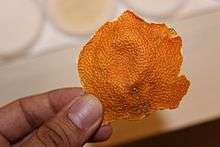Chenpi
| Chenpi | |||||||||||
 Chenpi drying in the sun in Hong Kong | |||||||||||
| Traditional Chinese | 陳皮 | ||||||||||
|---|---|---|---|---|---|---|---|---|---|---|---|
| Simplified Chinese | 陈皮 | ||||||||||
| Literal meaning | aged peel | ||||||||||
| |||||||||||

Plant as used in Chinese herbology (crude medicine)
Chenpi or chen pi (Chinese: 陈皮, pinyin: chénpí) is sun-dried tangerine (mandarin) peel used as a traditional seasoning in Chinese cooking and traditional medicine. They are aged by storing them dry. They have a pungent and bitter taste.
Cuisine
Some tong sui desserts such as red bean soup will use this occasionally.
Chenpi is used to make the Hunanese dish Orange Chicken.[1]
Medicine
Chenpi is a common ingredient in Traditional Chinese Medicine.
In traditional Chinese medicine, the dried peel of the fruit is used in the regulation of ch'i, and also used to treat abdominal distension, to enhance digestion, and to reduce phlegm.[2] Mandarins have also been used in ayurveda (traditional medicine of India).[3]
See also
- Zest (ingredient)
- Jujube
- List of dried foods
- Prune
- Food portal
References
- ↑ Lo, Eileen Yin-Fei (1999). "Poultry and Other Fowl". The Chinese Kitchen. calligraphy by San Yan Wong (1st ed.). New York, New York: William Morrow and Company. p. 314. ISBN 0-688-15826-9.
ORANGE CHICKEN Chun Pei Gai Pan Traditionally this Hunan recipe contained what is called chun pei, or ‘old skin,’ to describe the dried citrus peel used in its preparation.
- ↑ Yeung. Him-Che. Handbook of Chinese Herbs and Formulas. 1985. Los Angeles: Institute of Chinese Medicine.
- ↑ Chopra, R. N.; Nayar, S. L.; Chopra, I. C. Glossary of Indian Medicinal Plants. 1986. New Delhi: Council of Scientific and Industrial Research.
| ||||||||||||||||||||||||||||||||||
This article is issued from Wikipedia - version of the Friday, December 11, 2015. The text is available under the Creative Commons Attribution/Share Alike but additional terms may apply for the media files.